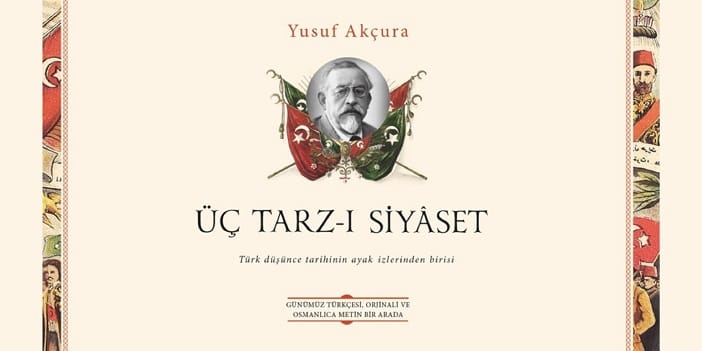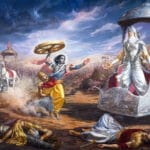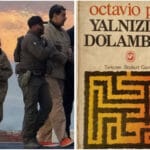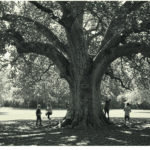Note: This article was first published in Yarın Magazine in 2004. Like Tevfik Fikret and Abdullah Cevdet, Akçura was one of those who, in an age of great defeat, headed toward the enemies of the Muslim Turkish nation (gavur), uncomfortable with his Islamic identity, a type that, as is fashionable today, can be called secular, that is, allergic to Islam. Akçura, who remained on the sidelines during the Second Constitutional Monarchy era because he could not find favor with the Unionists, especially Enver Pasha, and who, especially after Lausanne, was not able to get what he wanted despite siding with Kemalism in the description of the Turk that would please the West when the Anglo-Francophone regime called the Republic was established, his Turkism, that is, the meaning he attributed to the concept of the Turk, acquired a content very different from what he wrote in 1904. However, since the subject of this article is not ideological content but a strategic path-direction discussion, we found it worthwhile to write an open letter. We present to your attention this critical essay, published on the 100th anniversary of Three Types of Politics, once more with this explanation. (Ahmet Özcan)
———————————————————-
If the nation is humiliated, do not think its honor diminished; A gem does not lose its worth just by falling to the ground/
The one who aids the tyrant is vile among mankind, A dog is he who takes pleasure in serving a merciless hunter/
Let fate gather every means of tyranny and bring it forth, If I turn back from the nation’s path, call me a coward/
How enchanting you are, O vision of liberty! We became your captives, though we were freed from bondage.
— Namık Kemal
Dear Yusuf Akçura,
Has it been a hundred years, or ninety-nine? What is the secret behind the continued relevance of your 1904 article* published in the magazine called Türk published in Egypt? Is it its content, the questions it raises, or the “new path” it implies? In his book “What is Philosophy?”, the French philosopher G. Delauze states that philosophy in Ancient Greece began with “concept creation” and that in those times, everything that was already known in Egypt, Mesopotamia, Iran and India was actually “named” in Greek cities. Thus, “thought” finds a “homeland” for itself through concepts, and what is called philosophy, that is, “thinking about the unthought”, develops. I wonder if your article “Three Types of Politics” has retained its importance because it was the first to “name the known”?
Ottomanism, Islamism, Turkism… The fact that you, for the first time, mentioned Turkism as an alternative alongside the first two, carries its own significance. But the way you approached these issues, with a calm and objective language, analyzing each option in relation to reality, was another first in our tradition of thought. Then, we must give it credit; “Three Styles of Politics” presents a “theoretical technique” that is meaningful not only for the period in which it was written, but also today. It discusses, in the most concise terms possible – for those who know the subject, of course – what our options are, their pros and cons, their possibilities for realization, their difficulties, and their possible risks. Perhaps because we have long lost this “conversational” method, it was this “technique” that most drew my attention rather than the content of your essay. I should also add that you were born into a wealthy family in Kazan, settled in Istanbul after your father’s death, made contact with the Young Turks at the Military Academy and were exiled, studied political history in France, and then managed your uncle’s factories in Kazan. However, in your own words, you could not accept that “some people have to lose a lot for others to gain a lot” and chose a more idealistic life, returning to Istanbul after the declaration of the Constitutional Monarchy in 1908. I must say that this adventure, which could be considered an ordinary life story for your peers at the time you lived, is quite striking today, at least in terms of its impact on my correspondence with you. Because, for our time, this “idealism,” including those who share your Turkist ideas, is no longer considered very “lucrative,” “profitable,” or “realistic.” Nothing that doesn’t offer worldly benefits excites people. Maybe they’re right, I don’t know. After all, history is designed by idealists, and realists reap the rewards. Everyone chooses their path knowing this.
Dear Akçura,
Before delving into the content of your article, I must touch on one more point. Unfortunately, we are still in the same place… We still haven’t chosen our political style. We stand, endlessly, at a crossroads, “waiting.” We have acquired a modest parcel on this vast terrain of the world, and we stand guard, merely to keep it from being taken away. Apart from marking time, passing days, and surviving a bit longer without accident, we have no serious endeavor. Don’t misunderstand, we are not very happy or at peace either. We have produced unprecedented divisions and conflicts from the simplest of problems; we keep struggling with one another. We have raised all our vile spirits to power and trampled all our known virtues underfoot. We hate ourselves and, to gain the approval of others, spit on one another’s heads. We are on the verge of shattering; one more touch, and we will lose more; one more touch, and we will weep.
We have sacrificed so many of our children to futile wars, you know. How many brave souls we offered to hollow idols… Now they’re killing our children without a fight. They’re sacrificing them by erasing their souls, their personalities, their hopes. We’ve reached a point where we wish they would at least live for a cause like they used to, and die fighting even if it was a lie. If only it weren’t so easy to lose them…
We have been in this state for nearly fifty years, Mr. Akçura. We have grown used to living without compass or sword, without care or purpose. Whatever we’ve bound ourselves to, we’ve remained “bound.” The state seems “hostage” to the West, and we, in turn, are “hostages” to the state. Sometimes we challenge, sometimes we give in. In any case, we are in a network of “hostage” relationships. To earn money, we pawn our character; to gain power, our faith; to rise, our souls. You may not believe it, but we do not even know what we have pledged to the British Empire, besides commitments related to our religion, in the past to save our state and our parcel. And those who do know beat us at every opportunity. They always say to us; be quiet, sit down, don’t talk, don’t think, don’t ask.
We have not lost our way, Mr. Akçura, we simply haven’t chosen one. We still have no style of politics. Yet we still have Types of Politics’ options.
At the beginning of the 20th century, when Sultan Hamid was delaying collapse through his era of despotism, the agenda was to choose between preserving what existed (Ottomanism) or taking a new path (Islamism and Turkism). But weren’t we already Ottoman, Muslim, and Turk? Of course we were and there were those who criticized your article on that basis. But even then — I believe — they failed to understand in what sense you used these “options.”
We must first clarify that point. These “types of politics” are discussed as “foreign policies” that the state should pursue for its existence and continuity. It is known that neither you nor those who dealt with these topics in your context ever aimed to question anyone’s religious or ethnic origins. I mention this because, since your time, we have lost the “theoretical technique” ability I referred to earlier, and instead developed the skill of mixing apples and oranges. Thus, a policy once pursued for the sake of existence and survival now becomes synonymous with the denial of that very “existence and survival.” For example, when we abandon the politics of “Islamism,” we also attempt to abandon our Muslim identity; when we give up Turkism, we try to rebuild Turkish identity on “non-Turkish” traits. Since we abandoned Ottomanism, our tongues have worn out cursing everything Ottoman. However, Mr. Akçura, we “that is, our “existence” is “Ottoman”, “Muslim” and “Turkish” even if we do not want it. Just as, in the eyes of the average Westerner, no matter what we do, we remain the continuation of the Ottomans; just as even our most atheist individuals are considered “Muslim,” and our Kurds, Albanians, and Circassians are all seen as “Turks,” that’s exactly what we are. These three attributes are, so to speak, our own form of “WASP.” And ultimately, they are beyond dispute. Because when we speak of our existence, our continuity, our state, our nation, and our homeland, we always refer to what belongs to this implicit “we.” The opposite of our Muslimness is Christianity; the opposite of our Turkishness is enmity of Muslim Turk (gavur); and the opposite of our Ottomanism is Europeanism. However, perhaps because we are so far removed from both the act of choosing a direction and “the technique of choosing one”, we have managed to set our Muslimness against our Westernization, our Turkishness against our Kurdishness, and our Ottoman identity against our Republican era, and make them clash with eachother! As a result, we have failed to produce a balanced Western policy or a coherent modernization strategy; and our Muslimness, our Turkishness, our Kurdishness, and our other sub-identities have all been left battered and wounded.
We experienced this confusion most deeply in the matter of Westernization, Mr. Akçura. Ultimately, Westernization, a security “policy” aimed at becoming powerful like the West and being armed like the West against potential Western aggression, has turned into a process of civilizational, religious, and identity transformation, even self-destruction. While the alternative to Westernization could have been Easternization; the opposite of modernization, a pre-modern agrarian civilization; and the alternatives to Europe, America or Russia, we have always “thought” by adding “pears” to this basket of “apples.” For instance, we put our religion into competition on every level, at times, “Islam” became the alternative to the West; at other times, to modernity, secularism, democracy, or the republic… Instead of taking Islam, different of any religion or any doctrine as a critique of all forms of “idolatry” and servitude to man, we spent a century by making it a “rival” to systems, ideologies, and rules, right or wrong, that emerged at various points in social development. In the end, we gained nothing from it, but countries like England, Germany, and America, who have known since their missionary days how to use religion as a political weapon, “used” it against both us and, during the Cold War, against Russia. The Westerners pursued a policy “in the context” of what you call “Islamism” and which you stated would be possible to realise in the medium and long term – even though it would anger British Empire. Meanwhile, we were busy competing between “how to rid ourselves of Islam and become Western” and “how to rid ourselves of Westernizers and become better Muslims.” I don’t know, after all this experience, I’m not sure if we’ve learned that if we abandon Islam, we don’t become a Westerner, but rather an “infidel” according to Islam and—pardon me—just a fool according to Westerners, and that if we abandon the West, we become Easterner, Middle Easterner, Eurasianist, or something along those lines, and that being a better Muslim is only possible by remaining true to Muslim values such as prioritizing goodness and justice, siding with the oppressed against the oppressor, and staying away from all evil and harmful actions, no matter what “politics” we pursue!
To be honest, Mr. Akçura, ordinary people, society at large, have somehow managed to find a more reasonable and realistic understanding of these matters. But there is confusion among those who claim to know these issues best, intellectuals, scholars, and intellectuals.
Even in our high schools, we learn the basic rules of logic, categories, propositions, verification and falsification. Yet among our most educated, you can hardly find a trace of these. The result is that our common people can call an apple an apple, and a pear a pear, and live more peacefully. But thanks to our know-it-all elites, we are never short of false and logically inconsistent conflicts like Islamist vs. secular, Alevi vs. Sunni, Kurdish vs. Turkish, pro-EU vs. anti-EU, and so on. Don’t misunderstand me please, I have no intention of promoting anti-intellectualism or hostility toward knowledge. I’m merely trying to suggest that the pathology we suffer from is, ultimately, not social in nature, it exists mainly among the elite and therefore remains curable. If even one of the conflicts we have lived through in the past fifty years had truly originated from the people, I doubt that a country called Türkiye would still exist today. Abdullah Laroi, a thinker of Arab origin, says, “In the past, as ideologists and sociologists, we used to tell societies how to live and what to do. Now, we try to understand societies and infer what we should do.” It seems we must finally abandon our habit of paying the price for the false agendas of elites detached from the society they seek to reshape it.
Dear Akçura,
When analyzing the three types of politics at the beginning of the last century, you first criticize ‘Ottomanism’. As a policy of the Tanzimat era, Ottomanism, in your view, ‘aimed to preserve the empire’s old borders by creating a single nation like the American nation.’ You note that this policy was born during the reign of Mahmud II, implemented by Ali and Fuat Pashas, and based on the French Revolution’s concept of nationhood with the political support of Napoleon III. After Prussia’s victory in the 1870–71 Franco-Prussian War, the German, race-based concept of nation came to the fore, and the French model lost its political appeal. You record Mithat Pasha’s assassination as the date when Ottomanism was abandoned.
From that point on, Islamism the second style of politics, which had begun during Abdülaziz’s reign and was put into action by Abdülhamid II, came into play. This strategy, aimed at weakening Britain’s influence with the political support of Wilhelm II, was also adopted by the Young Ottomans, who set out with the idea of Ottomanism. You emphasize that this policy intensified anti-Turkish sentiment in Europe and encouraged the non-Muslim elements within the empire toward separatism. Yet you add that Islamism was, in the long term, a realistic and achievable policy.
Thirdly, you analyze Turkism, which you describe as still being merely an ‘idea’ and you note that it entered the agenda in parallel with closer relations with Germany. You put your personal inclination in favor of Turkism, even though it might anger Russia, and you end your article by stating that we have to choose between Islamism and Turkism.
From this picture you draw, it becomes clear that, in terms of foreign policy throughout the 19th century, the Ottoman Empire viewed Britain as a latent threat and therefore first aligned with France through Ottomanism, then, as France drew closer to Britain against a rising Germany, the Empire shifted toward the German axis against both. It implicitly appears that, the eternal enemy Russia, could thus be balanced by Germany. In this case, the strategic meaning of the policies of Islamism and Turkism that existed during both the First and Second World Wars becomes more evident. After the Second World War, as we know, the ownership of both these policies passed to the United States, and their objectives were redirected toward Russia.
I don’t need to mention that after you wrote your essay in 1904, the political strategies you deemed applicable were tried one last time by the Committee of Union and Progress, only to end in failure. That great period of action, led by the Teşkilat-ı Mahsusa (Special Intelligence Organization) and aimed at igniting British colonies through Muslim uprisings, came to an end with the betrayal of Sharif Hussein. When Bolshevik Russia shifted its policy by reaching an agreement with Britain in 1921, Enver Pasha’s attempt to awaken Turan also collapsed. The trauma and anger caused by these two early 20th-century disappointments are still present at the state level today.
As a result of this disappointment, Mustafa Kemal shaped the Republic on a more real basis, on a different path within our current borders. Islam and Turkism ceased to be tools of foreign policy and were instead reinterpreted within a completely new context, ‘folded into’ the body of the new republic. Measures were taken to prevent them from once again becoming instruments of external politics, and they were thus ‘temporarily’ set aside. Ultimately, although the three types of politics-Ottomanism, İslamism and Turkism- were each invalidated and overcome, but they were given new meaning within the new borders and regime and became the cement of the new nation.
When these final lines of resistance in our long and tragic process of retreat disappeared, what remained was the Westernization policy, that continuing at another, more categorical level as a security strategy. This policy, taking on the mission of reconstruction, left its mark on the first decade of the Republic. However, in the years that followed, it was transformed into a new form of Tanzimatism, applied as a change of identity and civilization that undermined our hidden inner dynamics.
As the 20th century came to a close, we saw that this policy of Westernization, too, had come to an end. Westernization ended not because a different path was taken, but because Westernization had reached its logical conclusion and the purpose had been achieved. Was it successful? Of course not. Because, after all, an apple cannot turn into a pear. Westernization quietly disappeared from the agenda, leaving behind new problems and difficulties. From this point on, we can no longer speak of Westernization as a unified whole. But our Westernization agendas seem to continue, in the context of more fundamental transformation quests such as modernization, economic-political integrations such as the EU, and military-political subcontracting policies such as Americanism.
This point is important, because the process that began with the Republic, that is, the artificial image created by Westernization replacing the previous style of politics, has disappeared, and now we are back to the crossroad of a century ago! What will be our political strategy from now on, as a nation, as a country, as a state, and how will our economic-political order be shaped accordingly? What is our path, our direction, our line? Where are we heading, and why? The question stands before us once again, awaiting an answer.
Dear Akçura,
At this new crossroads we have reached, again, it seems we have three options in the main lines, just like in your era:
1) Nationalism: This option, much like Ottomanism in your era, is essentially about preserving the status quo and reacting against every new or alternative idea. At present, it manifests itself in two factions: Left-Kemalist and Turkist. The Left-Kemalist faction, anti-globalist abroad and dogmatic-totalitarian at home, represents a form of worship of the status quo. Often aggressive due to its incompatibility with many segments of society and its possession of state power. It is a defensive ideology of a line closed to any effort at persuasion and dialogue.
The Turkist faction, on the other hand, seeks to reproduce dependencies and habits from the Cold War era. Domestically, with all its known theses and ideological levels, from making the Sumerians Proto-Turks to the ‘kart-kurt’ discourse (a rhetoric that claims Kurds are originally Turks), seems unaware that he is one of the obstacles to a real nationalization process. Abroad, as in your time, its rhetoric of Turanism serves as an ideological subcontractor to the American-British axis in Central Asia, under the guise of Eurasianism.
Ultimately, nationalism, with all its factions, is not a positive option; rather, it contains dangerous adventures, subcontracting, and conflict dynamics, both for the country and for our immediate environment. Moreover, it is highly doubtful that it is truly national, with its attitude of constantly fighting with the ‘nation’ on the basis of either religion or ethnicity, and that it is truly Eurasianist, with its lens of describing Eurasia from the Atlantic. Rather than being one of the alternatives available to our country, this option acts as a lightning rod that obstructs and disrupts real alternatives. I believe this path leads only to fascism.
2) Europeanism: Although this policy carries the claim and desire to bring Türkiye into the European Union, it is again an operational option that takes on different missions and meanings as the possibility of such membership diminishes. Three factions stand out within the party. The first are those acting as Europe’s lobby in Türkiye. The second are those who support EU membership, acting as an indirect component of the effort to dismantle, or failing that, encircle, the EU, aligned with the US, UK, and Israel. These are the most militant and reckless factions of Europeanism. Thirdly, they are comprised of naive liberals, leftists, and Kurdish activists who are outside these political equations and perhaps even aspire to enter them from the periphery, claiming, “If we join the EU, we’ll get rid of the military-civilian bureaucracy and the coaches, and we’ll get human rights and money.”
Europeanism is the most vociferous type of politics, presented almost as if it were the only serious option, even though it is not a serious alternative for us. The whole point is to stall Türkiye, pass the time, look good to others, and change laws in parliament. In my opinion, even if they were to strongly applaud Türkiye into the EU one day, Europeanism, as a political type that requires a significant lack of dignity and character to defend, is nothing but a new type of Tanzimatism. Down this road lies yet another phase of dissolution and liquidation.
3) Eurasianism: Let me clarify; for the Left-Kemalist nationalists, Eurasianism means cooperation with Russia, as M. Kemal once did to counterbalance Britain, as for the Turkists, perhaps embarrassed to say Turan, it refers to their imagined Central Asian unity, and in that sense aligns with Brzezinski-style American Eurasianism. This rhetoric seems aimed at concealing Americanism while politely expressing anti-European sentiment. I do not believe Türkiye has, or will have, anything to do with such a conception of Eurasianism.
Mr. Akçura, our true Europe, our true Eurasia, that is, our Türkiye centered foreign vision is the geopolitical and geocultural space once encompassed by the widest borders of the Seljuks and Ottomans. Again, this necessitates a clear and consistent Pax Ottoman policy towards these boundaries. (In this sense, the Ottoman Empire, as a dynasty, a political entity, etc., is now dead, but as a historical accumulation and experience, in other words, as a natural habitat and realpolitik horizon. History is not resurrected, but it is not lost either!) And of course, it also includes a new phase of nationalization in which all elements such as Turks, Kurds, Circassians, Albanians, Arabs, Bosnians, Georgians, etc. are perceived as composites of a single nation. The non-Muslim nations remaining from the Ottoman Empire can be part of this alliance, a component, or an ally if they so choose. Externally, it views integrated and synchronized relations with the US and EU, Russia, and especially its immediate neighbors as the foundation of its foreign policy.
The Pax Ottoman horizon includes both the continuity of a more original-national modernization line compared to the old Ottoman Tanzimatism and the re-consolidation of the ancient state form as an anti-global position through its restoration as modern and necessarily democratic, that is, based on the principles of the willpower of the people, justice and freedom. On the other hand, in addition to its natural stance of protecting both the Islamic world and other eastern peoples, it also represents an alternative globalism that is open to the conscience of humanity all over the world.
In other words, a symphonic politics that can make balanced distinctions and adjustments between the realities and ‘realizability’ of real politics with the unity of belief, language and emotion.
A consolidation that will re-establish all ethnic, sectarian and dispositional pluralism from Edirne to Kars as a nation is the name of a proud and noble restoration that will be a beacon and a torch for all the oppressed people of the world, from the forests of Mexico to the Philippines, and this is our universal horizon.
Mr. Akçura, you know well that when you wrote “Three Types of Politics”, the footsteps of a great imperial war were already echoing, while the decayed Ottoman elite were busy saving the day and filling their pockets. Today, too, there are Western-backed proxy wars being fought ‘on our lands’, and everyone knows the aftermath may bring even more dreadful consequences. Once again, we face the risk of losing what little we have left. Yet now, we can no longer avoid confronting ourselves. We have a state at odds with its people, a decayed elite, disillusioned intellectuals, and a desperate nation uncertain of its future. After a century of running in circles, we have returned to the same point, and now we stand before a new three types of politics. This time, the cost of our dependence on the West may be far heavier.
Would you believe it, Mr. Akçura, many sensible people were looking at this scene and saying, ‘This country is finished,’ ‘We have lost,’ ‘We are exhausted.’ They used to say, ‘Asabiyyah can not come out of all this corruption, degeneracy, recklessness.’ But we also say ‘stubbornness’, we say ‘let our path be clear’, we say ‘let us trust ourselves’. We say, ‘This nation is greater than those who beat it.’ We say, ‘This country will certainly find a way and move forward.’ We say, ‘Both homeland and freedom.’ In short, we say, ‘God is great.’
Farewell…
*Yusuf Akçura, Üç Tarz-ı Siyaset (Three Kinds of Policy), Turkish Historical Society Press, Ankara, 1976.Source: Ahmet Özcan, Açık Mektuplar, Yarın YAY., Istanbul, 2008.









